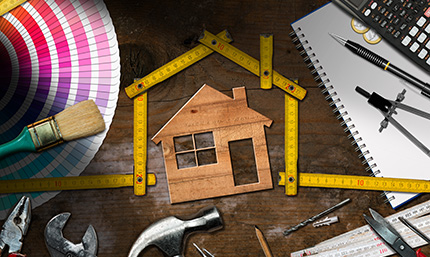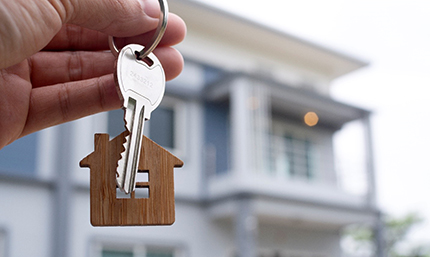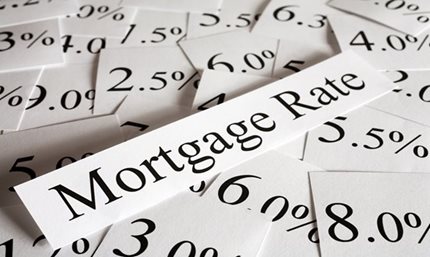News & Tips
Down Payments: How Much is Enough?

As you’re saving up to buy a house, the burning question is how much is enough to put down—and the answer is that it depends upon numerous factors. We’ll walk you through three of them so you can make the best decision for your unique situation. These factors include:
- The type of mortgage loan you’re getting
- How much you can afford in a monthly principal and interest payment
- How long you plan to live in the house
When considering down payments, keep in mind you’ll typically see them as percentages. That’s because the mortgage down payment is really relative to the price of the home you’re buying. For example, a 3% down payment on a $300,000 home would be $9,000.
Types of Mortgages
Three of the more common types of mortgage loans are FHA loans, VA loans, and conventional loans. Let’s take a look at the down payment amounts and requirements for each of these and a brief look at jumbo mortgage loans, too.
FHA Loans
With FHA loans, you’d need to apply with an FHA-approved lender such as Space Coast Credit Union (SCCU). Upon approval, SCCU would provide the financing for the home, which is backed by the Federal Housing Authority. This provides protection for the lending institution in case the borrower can’t make the required mortgage payments.
When it comes to the mortgage down payment, specifics can vary by lender. Generally, requirements for FHA loans involve a down payment of at least 3.5%, as long as the borrower meets certain requirements; this is less than the traditional standard for conventional mortgage loans of 20%.
Note that with FHA loans, you’d also need to pay a mortgage insurance premium (MIP) fee. This protects the lender in case of a borrower default. You’ll pay this fee as part of your upfront closing costs and then pay an annual fee; the latter typically lasts for the length of the loan.
As you make your borrowing decisions, contrast the FHA’s MIP with private mortgage insurance (PMI) paid on conventional loans that have less than a 20% down payment. PMI typically ends when you’ve paid enough on your loan to reach 20% equity or another specified milestone.
Here’s more information about what you need to know before applying for an FHA loan. Plus, here’s a look at Florida-specific requirements for an FHA loan—and SCCU’s current FHA mortgage rates.
| Term | Rate "As Low As" | APR* "As Low As" | Example Loan Amount | Example Monthly Payment |
|---|---|---|---|---|
| 15 Years | 5.375% | 5.517% | $300,000 | $2,431.40 |
| 30 Years | 6.125% | 6.212% | $300,000 | $1,822.83 |
Example monthly payments do not include taxes and insurance, and the actual payment obligation will be greater.
HOME LOANS: Rates based on creditworthiness. Mortgage loans are originated by Space Coast Credit Union and are subject to credit approval, verification, and collateral evaluation. Programs, offers, rates, terms, and conditions are subject to change or cancellation without notice. Certain restrictions apply. Taxes and insurance not included; your actual payment obligation will be higher.
These mortgage loan programs constitute first mortgage liens secured by the home and property. Your down payment is determined by the Loan-to-Value ratio. (90% LTV = 10% down payment). Loans exceeding 80% of the appraised value of the home require private mortgage insurance. Member responsible for any funds needed for closing costs and pre-paid escrow.
VA Loans
If you meet the eligibility requirements of the U.S. Department of Veterans Affairs (VA) for a VA loan and are approved for one by a private lender, you usually won’t need to worry about a down payment. That’s because the VA guarantees the loan. That said, the lender may require a down payment despite the VA guarantee—often because the sales price is higher than the appraised value of the home. (At SCCU, 100% financing66 can be available on VA loans for eligible members.)
So, what are these eligibility requirements? They’re tied to your length of military service or service commitment as well as your duty status and service character. Qualifying people can include active service members, veterans, National Guard or Reserve members, and spouses of someone who died on active duty or as a result of service-related disabilities.
You can find more information about eligibility requirements and loan requirements in our VA loan blog post. Plus, here’s information about SCCU’s VA loans, including mortgage interest rates.
We also offer Hero Loans. These loans are a form of appreciation for those who serve on the front line: first responders, medical professionals, law enforcement, educators, military personnel, and Department of Defense and government contractors.
| Term | Rate "As Low As" | APR* "As Low As" | Example Loan Amount | Example Monthly Payment |
|---|---|---|---|---|
| 15 Years | 5.375% | 5.517% | $300,000 | $2,431.40 |
| 30 Years | 6.125% | 6.212% | $300,000 | $1,822.83 |
Example monthly payments do not include taxes and insurance, and the actual payment obligation will be greater.
Rates based on creditworthiness. VA Home Loans are available to eligible service members, veterans and surviving spouses. Up to 100% financing is available. At closing, member will be responsible for any closing costs, prepaid escrow reserves, and any optional discount points.
HOME LOANS: Mortgage loans are originated by Space Coast Credit Union and are subject to credit approval, verification and collateral evaluation. Programs, offers, rates, terms, and conditions are subject to change or cancellation without notice. Certain restrictions apply. Taxes and insurance not included; your actual payment obligation will be higher.
These mortgage loan programs constitute first mortgage liens secured by the home and property. Your down payment is determined by the Loan-to-Value ratio. (90% LTV = 10% down payment) Loans exceeding 80% of the appraised value of the home require private mortgage insurance. Member responsible for any funds needed for closing costs and pre-paid escrow.
Conventional Mortgage Loans
Conventional home loans offer the stability of having a fixed mortgage amount every month throughout the life of the loan. While you can put less than 20% down nowadays for conventional loans, it’s still a magic number. Why? With 20% down, you don’t need to worry about PMI, which is an extra monthly amount (usually between 0.5% and 1% of the loan’s value) on top of the mortgage payment.
Because lenders regard a 20% down payment as a sign of responsible borrowing, the financial institution may offer a better interest rate on loans that have that amount.
Having said all that, SCCU recognizes that saving for a 20% down payment can be easier said than done. Plus, you may decide that keeping more money in an emergency savings fund is important to you; therefore, you may want to provide a down payment that’s less than 20%.
We offer multiple home loan programs with a range of mortgage down payments to suit every member’s needs. These include:
- No Down Payment Home Loan that can be ideal to create a quicker path to home ownership
- Conventional Fixed-Rate Home Loan with a down payment as low as 5%16
- Adjustable-Rate Home Loan with a down payment as low as 5%16
Here’s more info about getting a conventional mortgage loan.
| Term | Rate "As Low As" | APR* "As Low As" | Example Loan Amount | Example Monthly Payment |
|---|---|---|---|---|
| 10 Years - Purchase or Refi | 5.250% | 5.451% | $300,000 | $3,218.75 |
| 15 Years - Purchase | 5.375% | 5.517% | $300,000 | $2,431.40 |
| 15 Years - Refinance | 5.625% | 5.768% | $300,000 | $2,471.20 |
| 20 Years - Purchase or Refi | 6.125% | 6.240% | $300,000 | $2,170.98 |
| 30 Years - Purchase | 6.125% | 6.212% | $300,000 | $1,822.83 |
| 30 Years - Refinance | 6.375% | 6.463% | $300,000 | $1,871.61 |
Example monthly payments do not include taxes and insurance, and the actual payment obligation will be greater.
HOME LOANS: Rates based on creditworthiness. Mortgage loans are originated by Space Coast Credit Union and are subject to credit approval, verification, and collateral evaluation. Programs, offers, rates, terms, and conditions are subject to change or cancellation without notice. Certain restrictions apply. Taxes and insurance not included; your actual payment obligation will be higher.
These mortgage loan programs constitute first mortgage liens secured by the home and property. Your down payment is determined by the Loan-to-Value ratio. (90% LTV = 10% down payment). Loans exceeding 80% of the appraised value of the home require private mortgage insurance. Member responsible for any funds needed for closing costs (unless member attached a No Closing Costs option to loan) and pre-paid escrow.
Jumbo Mortgage Loans
When your dream home comes with a higher sales price—perhaps being a wonderful waterfront retreat—this will involve special financing considerations. Luckily, jumbo home loans at SCCU can transform those dreams into reality.
Jumbo loans are available when the loan amount is greater than a certain amount, and we make them available with just 10% down16 with certain restrictions. Plus, typically, no PMI is required! Wondering about jumbo mortgage rates in Florida? Here are SCCU’s interest rates for jumbo loans.
| Term | Rate "As Low As" | APR* "As Low As" | Example Loan Amount | Example Monthly Payment |
|---|---|---|---|---|
| 10 Years | 5.375% | 5.481% | $850,000 | $9,172.18 |
| 15 Years | 5.500% | 5.575% | $850,000 | $6,945.21 |
| 20 Years | 6.250% | 6.311% | $850,000 | $6,212.89 |
| 30 Years | 6.250% | 6.296% | $850,000 | $5,233.60 |
Example monthly payments do not include taxes and insurance, and the actual payment obligation will be greater.
HOME LOANS: Rates based on creditworthiness. Mortgage loans are originated by Space Coast Credit Union and are subject to credit approval, verification, and collateral evaluation. Programs, offers, rates, terms, and conditions are subject to change or cancellation without notice. Certain restrictions apply. Taxes and insurance not included; your actual payment obligation will be higher.
These mortgage loan programs constitute first mortgage liens secured by the home and property. Your down payment is determined by the Loan-to-Value ratio. (90% LTV = 10% down payment) Loans exceeding 80% of the appraised value of the home require private mortgage insurance. Member responsible for any funds needed for closing costs and pre-paid escrow.
How Much You Can Afford
Returning to the initial question of this article—how much of a down payment you should put down—here’s a second key factor: how much you can afford as a monthly payment. To find out, you can use the debt-to-income ratio (your “DTI”) as guidance; this ratio compares what you earn against what you would owe. Lenders use this ratio to determine how much of a risk they would be taking by loaning you the amount you’ve requested on your home loan.
You can use our “Home Affordability” calculator to quickly find your ratio. If you’d like to manually calculate yours to better understand the steps behind the calculation, here’s what you’d do:
- Add together all of your monthly sources of gross (pre-tax) income.
- Multiply that figure by the lender of choice’s DTI factor; let’s say 38%.
- Your total debt payments each month should not exceed this amount.
- Add up your monthly debt payments: housing payments, car payments, student loan payments, credit card payments, personal loans, and so forth.
- Subtract the total in number four from the amount calculated in step two.
- The result is the largest mortgage payment you can afford, which would include your principal and interest, property taxes, homeowners insurance and PMI, and HOA fees, if relevant.
Now let’s say that, because of your DTI ratio, you can’t afford the house you want. What can you do?
To find the answer to that question, consider the four elements that go into the calculation of principal and interest payments and explore your options:
- Price of the home: You could either negotiate with the seller to reduce the selling price of the home or seek another home with a lower price point.
- Current interest rate: When the mortgage rate is higher, so is the principal and interest payment. Although the interest rates themselves are out of your control, you could choose a loan program with a lower mortgage rate—perhaps the adjustable-rate mortgage, which tends to come with lower initial interest rates, instead of the fixed program—or watch for mortgage rates to go down.
- Length of the mortgage: If you opt for a longer mortgage, this would reduce the principal and interest payment, although you would then pay more interest over the life of the loan. Plus, lenders have term limits on the loan programs they offer.
- Mortgage down payment: As a fourth strategy, to afford more house, you can increase the amount of your mortgage down payment to lower the amount you borrow and, therefore, your principal and interest payment.
You can use our “Calculate a Mortgage Payment” calculator to experiment with different loan amounts to see the best way to move forward with your home loan and qualify for your home of choice. Here's more information about buying a home with little to no money down.
How Long You Plan to Have the Home
Here’s something else to consider when deciding how much of a mortgage down payment to put down: when you think you’ll sell the house. You can’t always know the answer, of course. But if it’s likely to be within a few years of its purchase—perhaps because of an anticipated job change—you may decide not to invest a large down payment in case real estate prices go down.
Also, if you don’t plan on being in the home for more than 3-5 years, then an adjustable-rate mortgage may be a good option for you, where you get a low introductory interest rate for a certain amount of time. And with many mortgages, you can refinance the home later.
Considering the three overarching factors—mortgage type, what you can afford, and future plans for the house—can help you decide how much to put down on your loan.
Saving for a Mortgage Down Payment
What if you find that you don’t have enough to put down for a house? Here is a strategy to consider.
When creating a budget to save for a down payment, you can use our "Save Towards a Goal" calculator. Simply enter the amount of money you want to save for this purpose along with your planned timeline. List the current balance of the money you’ve saved so far, the amount you plan to add monthly to the account, and the expected rate of return.
You can quickly see whether your savings plan is significant enough to meet your goal on time. If not, you’ll see how much more you’d need to save to reach that goal. As part of your budget-making process, you may find expenses you can cut out or at least trim down to save more money for your down payment.
Learn more about our affordable housing program!
Should I Make a Large Mortgage Down Payment?
If you’ve saved up enough money, can cover other expenses, and still have an emergency savings fund, then making a large down payment would be highly beneficial. You’ll have a lower payment, and you would pay less interest over the life of your loan. Plus, having that kind of equity could be handy if you decide at some point to take out a home equity loan.
When you make a down payment, you’re really investing in your home. You may, however, want to resist putting all of your savings on the home loan as a down payment. You’ll need some for closing costs (although our No Closing Costs Home Loan addresses that issue). But, there’s another reason. When you buy a home, unexpected expenses can come up, and you’ll want to have a financial cushion. When you get the house of your dreams, you don’t want it to be a challenging time as you navigate unanticipated costs.
Deciding what, exactly, to put down on your home can be a balancing act as you weigh the pros and cons of the amount. Is your emergency fund significant enough? Are you also saving for your children’s college funds? Do you need to boost the amount you’re saving for retirement? These are important issues to consider.
Choosing a Credit Union for Your Mortgage Loan
When deciding where to get your mortgage loan and which program to select, plenty of benefits exist when you opt for a credit union. As a not-for-profit cooperative, credit unions are specifically designed to benefit their members (which is what credit unions call their customers) and help them on their path to financial wellness. In this niche financial structure, there are no stockholders’ interests to consider because the members are the owners of the credit union. Said another way, its members are the shareholders.
More specifically, an individual credit union is created for people who live in a particular geography or work in a certain profession. SCCU started out small, founded in 1951 as Patrick Air Force Base Credit Union with 28 members and $372 in assets.
Since then, we’ve continued to expand to serve even more members—and today, we serve more than 623,000 members with more than $8.6 billion in assets. We serve 34 counties with more than 60 branches, and our geography spans throughout Florida. And now, we’re Florida’s third-largest credit union, thanks to our wonderful members.
When you’re looking for the best mortgage loan and the right place for your financial services, here are the benefits of a credit union:
- Mortgage rates at a credit union are typically lower than at a bank.
- Fees are typically lower as well.
- Credit unions also typically provide higher interest rates on savings accounts.
- Loan decision-making is local.
- Team Members provide personalized service.
- Credit unions offer financial wellness resources.
- By becoming a credit union member, you make it stronger—which helps other members.
As SCCU continues to grow, we exist solely for the same reason as when we began: to serve our members.
Get Your Mortgage Loan at SCCU
SCCU offers a wide range of mortgage programs that have varying requirements for a down payment for your home purchase. As our Members’ Watchdog, we’re always looking out for our members’ interests—whether they’re looking to buy their first home, move up, or downsize.
No matter which program you pick, here’s what stays the same: competitive mortgage rates and low fees with flexible terms. No matter which one you select, decision-making remains local, with fast pre-qualification decisions. We then provide a convenient electronic closing option.
If you’re ready to apply online, just choose your mortgage program from this menu and click “Apply Now.” If you have questions, our experienced, friendly credit union team is happy to help.
































